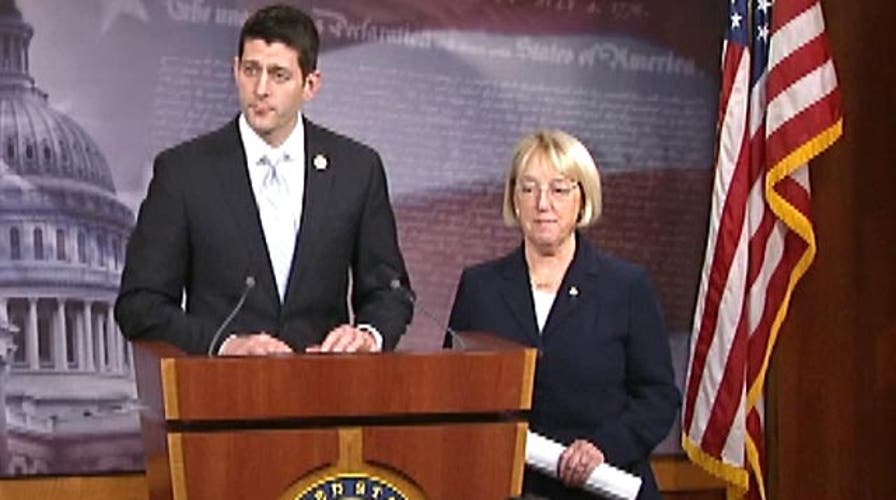Conservative groups pushed back hard against the proposed federal budget agreement announced Tuesday, arguing that the tentative deal unravels hard-fought spending cuts.
Senate Budget Committee Chairwoman Patty Murray, D-Wash., and House Budget Committee chairman Paul Ryan, R-Wis, the lead negotiators on the agreement, detailed the specifics of the proposal at an evening press conference.
The proposal would restore about $63 billion in funding that had been cut by the so-called sequester. Officials said the increases would be offset by a variety of spending reductions and increased fees elsewhere in the budget totaling about $85 billion over a decade, leaving enough for a largely symbolic deficit cut of $23 billion over the next decade.
The deal sets discretionary spending levels at just over $1 trillion, which is higher than the level of $967 billion set in a 2011 budget pact.
While Ryan predicted that conservatives would support the bill and GOP leaders praised the negotiators, Sen. Marco Rubio, R-Fla., came out against it.
“In the short run, this budget also cancels earlier spending reductions, instead of making some tough decisions about how to tackle our long-term fiscal challenges caused by runaway Washington spending,” he said.
Prominent conservative organizations warned that lawmakers were simply trading increased spending now for "promises" of cuts sometime in the future. Heritage Action called it a "step backward" in a USA Today column Wednesday.
“This budget deal creates a faux peace in Washington, D.C., while burdening taxpayers by sweeping the impending fiscal crisis under the rug," Amy Kremer, chairwoman of the Tea Party Express, said in a statement. "If the Sequestration was a baby step forward, this is a baby step backward."
Americans for Prosperity, FreedomWorks and Heritage Action previously came out against any plan that increases spending. These groups are particularly influential in the House, where many sitting Republican members won election with their help.
Americans for Prosperity President Tim Phillips warned prior to Tuesday's announcement that any Republicans who supported such a plan would be joining liberal Democrats in "breaking their word" to Americans about reining in government spending.
“This budget compromise is not just bad policy, it is bad politics,” Phillips said in response to the announced deal. “The American people remember hard-won bipartisan spending limits set by the sequester, and are not pleased to see their conservative representatives so easily go back on their word to rein in government over-spending."
Al Cardenas, chairman of the American Conservative Union, said conservatives "appreciate the beginning of a more disciplined approach to spending," but called on congressional negotiators to return to the drawing board.
"The solution is not to walk away from progress and add over $60 billion in spending over the next two years. We are not impressed by the cost cutting gimmicks and urge members of Congress to tell the budget conference to get back to work," Cardenas said in a statement.
President Obama praised the deal for replacing parts of the sequester cuts, which he said "have harmed students, seniors, and middle-class families and served as a mindless drag on our economy over the last year."
Calling the deal "balanced," Obama said he also is pleased Congress was able to break the cycle of crisis-driven decision-making to reach a compromise.
One senior House Republican source predicted to Fox News that the party would have the votes to pass the deal, though they speculated the GOP may lose a “healthy chunk” on their side.
Both Murray and Ryan expressed confidence the deal would pass as well, and called upon their colleagues to do so.
“I'm confident we won't have 100 percent of the Senate or the House,” Murray said. “But I want people to know this Congress can work.”
The hesitation, and opposition, on both sides, though, indicates that congressional leaders still have a lot of convincing to do. Congress has until Jan. 15 to pass a new budget or they will trigger another partial government shutdown.
Fox News' Chad Pergram and The Associated Press contributed to this report.





